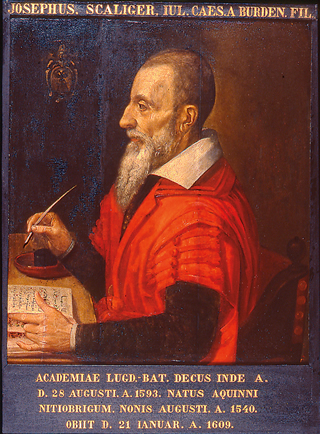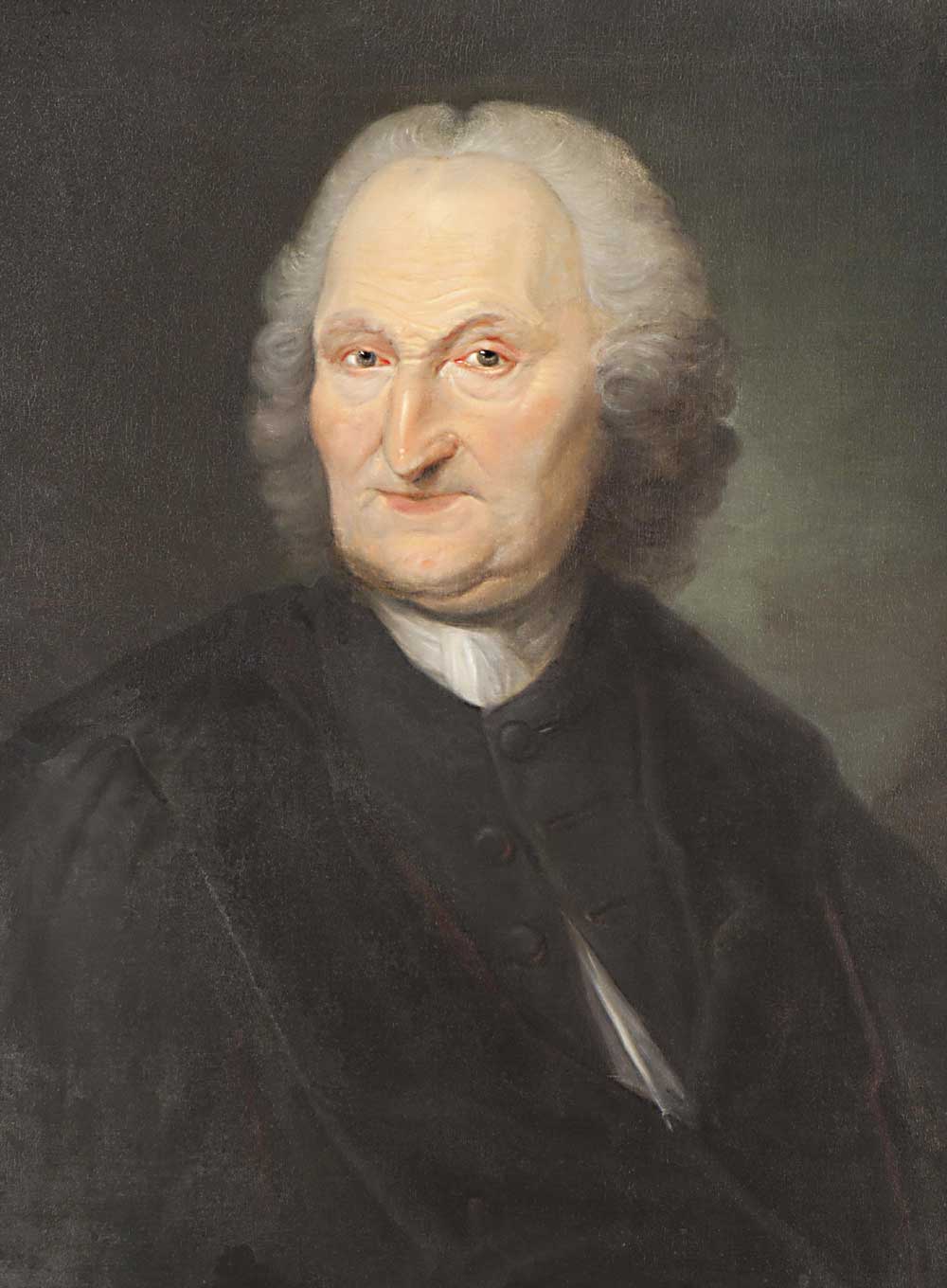|
David Ruhnken
David Ruhnken (2 January 172314 May 1798) was a Dutch classical scholar of German origin. Origins Ruhnken was born in Bedlin (today Bydlino) near Stolp, Pomerania Province, (today Słupsk, Poland). After he had attended Latin school at Königsberg (1737–1741), his parents wanted him to enter the church, but after two years at the University of Wittenberg he determined to live the life of a scholar. At Wittenberg, Ruhnken studied with two distinguished professors, Johann Daniel Ritter and Johann Wilhelm von Berger. To them he owed a thorough grounding in ancient history and Roman antiquities and literature; and from them he learned a pure and vivid Latin style. At Wittenberg, Ruhnken also studied mathematics and Roman law. The only thing that made him want to leave Wittenberg was a desire to explore Greek literature. Neither at Wittenberg nor at any other German university was Greek being seriously studied at the time. It was taught to students in divinity for the sake of the ... [...More Info...] [...Related Items...] OR: [Wikipedia] [Google] [Baidu] |
Bydlino
Bydlino (german: Bedlin) is a village in the administrative district of Gmina Słupsk, within Słupsk County, Pomeranian Voivodeship, in northern Poland. It lies approximately north of Słupsk and west of the regional capital Gdańsk. The village has a population of 210. Notable residents * David Ruhnken David Ruhnken (2 January 172314 May 1798) was a Dutch classical scholar of German origin. Origins Ruhnken was born in Bedlin (today Bydlino) near Stolp, Pomerania Province, (today Słupsk, Poland). After he had attended Latin school at König ... (1723–1798), scholar References Bydlino {{Słupsk-geo-stub ... [...More Info...] [...Related Items...] OR: [Wikipedia] [Google] [Baidu] |
New Testament
The New Testament grc, Ἡ Καινὴ Διαθήκη, transl. ; la, Novum Testamentum. (NT) is the second division of the Christian biblical canon. It discusses the teachings and person of Jesus, as well as events in first-century Christianity. The New Testament's background, the first division of the Christian Bible, is called the Old Testament, which is based primarily upon the Hebrew Bible; together they are regarded as sacred scripture by Christians. The New Testament is a collection of Christian texts originally written in the Koine Greek language, at different times by various authors. While the Old Testament canon varies somewhat between different Christian denominations, the 27-book canon of the New Testament has been almost universally recognized within Christianity since at least Late Antiquity. Thus, in almost all Christian traditions today, the New Testament consists of 27 books: * 4 canonical gospels (Matthew, Mark, Luke, and John) * The Acts of the Apostl ... [...More Info...] [...Related Items...] OR: [Wikipedia] [Google] [Baidu] |
Latin Literature
Latin literature includes the essays, histories, poems, plays, and other writings written in the Latin language. The beginning of formal Latin literature dates to 240 BC, when the first stage play in Latin was performed in Rome. Latin literature would flourish for the next six centuries. The classical era of Latin literature can be roughly divided into the following periods: Early Latin literature, The Golden Age, The Imperial Period and Late Antiquity. Latin was the language of the ancient Romans, but it was also the ''lingua franca'' of Western and Central Europe throughout the Middle Ages, so Latin literature includes not only Roman authors like Cicero, Virgil, Ovid and Horace, but also includes European writers after the fall of the Empire, from religious writers like Aquinas (1225–1274), to secular writers like Francis Bacon (1561–1626), Baruch Spinoza (1632–1677), and Isaac Newton (1642–1727). History Early Latin literature Although literature in Latin fol ... [...More Info...] [...Related Items...] OR: [Wikipedia] [Google] [Baidu] |
Italy
Italy ( it, Italia ), officially the Italian Republic, ) or the Republic of Italy, is a country in Southern Europe. It is located in the middle of the Mediterranean Sea, and its territory largely coincides with the homonymous geographical region. Italy is also considered part of Western Europe, and shares land borders with France, Switzerland, Austria, Slovenia and the enclaved microstates of Vatican City and San Marino. It has a territorial exclave in Switzerland, Campione. Italy covers an area of , with a population of over 60 million. It is the third-most populous member state of the European Union, the sixth-most populous country in Europe, and the tenth-largest country in the continent by land area. Italy's capital and largest city is Rome. Italy was the native place of many civilizations such as the Italic peoples and the Etruscans, while due to its central geographic location in Southern Europe and the Mediterranean, the country has also historically been home ... [...More Info...] [...Related Items...] OR: [Wikipedia] [Google] [Baidu] |
Albrecht Ritschl
Albrecht Ritschl (25 March 182220 March 1889) was a German Protestant theologian. Starting in 1852, Ritschl lectured on systematic theology. According to this system, faith was understood to be irreducible to other experiences, beyond the scope of reason. Faith, he said, came not from facts but from value judgments. Jesus' divinity, he argued, was best understood as expressing "revelational-value" of Christ for the community that trusts him as God. He held the Christ's message to be committed to a community."Ritschl, Albrecht." Cross, F. L., ed. The Oxford dictionary of the Christian church. New York: Oxford University Press. 2005 Biography Ritschl was born in Berlin. His father, Georg Karl Benjamin Ritschl (1783–1858), became in 1810 a pastor at the church of St Mary in Berlin, and from 1827 to 1854 was general superintendent and evangelical bishop of Pomerania. Albrecht Ritschl studied at Bonn, Halle, Heidelberg and Tübingen. At Halle he came under Hegelian influences ... [...More Info...] [...Related Items...] OR: [Wikipedia] [Google] [Baidu] |
Valckenaer
Lodewijk Caspar Valckenaer (Leeuwarden, 7 June 1715 – Leiden, 15 March 1785) was a Dutch classical scholar, at Leiden. He was a follower of Tiberius Hemsterhuis, and his successor in 1766 in the chair of Greek at Leiden. He was born in Leeuwarden. The jurist and politician Johan Valckenaer Johan Valckenaer (Franeker, 21 January 1759 - Bennebroek, 1821) was a Dutch professor who specialized in Roman law. He was a passionate and combative patriot who promoted the right to bear weapons. In 1787 he went in exile in France and in 1793 h ... (1759–1821) was his son. Works *''Ammonius. De adfinium vocabulorum differentia'' (Leiden 1739) *''Dictata in antiquitates Graecas'' (1751) *''Observationes philologicae in Evangelium Lucae'' (1751) *''Observationes philologicae in Actus Apostolicos'' (1752) *''Observationes philologicae in primam Pauli epistolam ad Corinthios'' (1752) *''Phoenissae'' (1755) *''Diatribe in Euripidis deperditorum dramatum reliquias'' (1767) *''Euripidis Tragoe ... [...More Info...] [...Related Items...] OR: [Wikipedia] [Google] [Baidu] |
Isaac Casaubon
Isaac Casaubon (; ; 18 February 1559 – 1 July 1614) was a classical scholar and philologist, first in France and then later in England. His son Méric Casaubon was also a classical scholar. Life Early life He was born in Geneva to two French Huguenot refugees. The family returned to France after the Edict of Saint-Germain in 1562, and settled at Crest in Dauphiné, where Arnaud Casaubon, Isaac's father, became minister of a Huguenot congregation. Until he was nineteen, Isaac had no education other than that given him by his father. Arnaud was away from home for long periods in the Calvinist camp, and the family regularly fled to the hills to hide from bands of armed Catholics who patrolled the country. It was in a cave in the mountains of Dauphiné, after the St Bartholomew's Day's Massacre, that Isaac received his first lesson in Greek, based on Isocrates' ''Ad Demonicum''. At the age of nineteen Isaac was sent to the Academy of Geneva, where he read Greek under Fran ... [...More Info...] [...Related Items...] OR: [Wikipedia] [Google] [Baidu] |
Joseph Justus Scaliger
Joseph Justus Scaliger (; 5 August 1540 – 21 January 1609) was a French Calvinist religious leader and scholar, known for expanding the notion of classical history from Greek and Ancient Roman history to include Persian, Babylonian, Jewish and Ancient Egyptian history. He spent the last sixteen years of his life in the Netherlands. Early life In 1540, Scaliger was born in Agen, France, to Italian scholar and physician Julius Caesar Scaliger and his wife, Andiette de Roques Lobejac. His only formal education was three years of study at the College of Guienne in Bordeaux, which ended in 1555 due to an outbreak of the bubonic plague. Until his death in 1558, Julius Scaliger taught his son Latin and poetry; he was made to write at least 80 lines of Latin a day. University and travels After his father's death, Scaliger spent four years at the University of Paris, where he studied Greek under Adrianus Turnebus. After two months he found he was not in a position to profit from t ... [...More Info...] [...Related Items...] OR: [Wikipedia] [Google] [Baidu] |
Tiberius Hemsterhuis
Tiberius Hemsterhuis (9 January 16857 April 1766) was a Dutch philologist and critic. Life He was born in Groningen. His father, a learned physician, gave him a good early education and he entered the university of his native city in his fifteenth year, where he proved himself the best student of mathematics. After a year or two at Groningen, he was attracted to the University of Leiden by the fame of Perizonius. While there, he was entrusted with the duty of arranging the manuscripts in the library. Though he accepted an appointment as professor of mathematics and philosophy at Amsterdam in his twentieth year, he had already directed his attention to the study of the ancient languages. In 1717 Hemsterhuis was appointed a professor of Greek at the University of Franeker to replace Lambert Bos, but he did not enter on his duties there till 1720. In 1738 he became a professor of national history as well. Two years afterward, he was called to teach the same subjects at Leiden, whe ... [...More Info...] [...Related Items...] OR: [Wikipedia] [Google] [Baidu] |
Richard Bentley
Richard Bentley FRS (; 27 January 1662 – 14 July 1742) was an English classical scholar, critic, and theologian. Considered the "founder of historical philology", Bentley is widely credited with establishing the English school of Hellenism. In 1892, A. E. Housman called Bentley "the greatest scholar that England or perhaps that Europe ever bred". Bentley's ''Dissertation upon the Epistles of Phalaris'', published in 1699, proved that the letters in question, supposedly written in the 6th century BCE by the Sicilian tyrant Phalaris, were actually a forgery produced by a Greek sophist in the 2nd century CE. Bentley's investigation of the subject is still regarded as a landmark of textual criticism. He also showed that the sound represented in transcriptions of some Greek dialects by the letter digamma appeared also in Homeric poetry, even though it was not represented there in writing by any letter. Bentley became Master of Trinity College, Cambridge in 1700. His auto ... [...More Info...] [...Related Items...] OR: [Wikipedia] [Google] [Baidu] |
University Of Leiden
Leiden University (abbreviated as ''LEI''; nl, Universiteit Leiden) is a public research university in Leiden, Netherlands. The university was founded as a Protestant university in 1575 by William, Prince of Orange, as a reward to the city of Leiden for its defence against Spanish attacks during the Eighty Years' War. As the oldest institution of higher education in the Netherlands, it enjoys a reputation across Europe and the world. Known for its historic foundations and emphasis on the social sciences, the university came into particular prominence during the Dutch Golden Age, when scholars from around Europe were attracted to the Dutch Republic due to its climate of intellectual tolerance and Leiden's international reputation. During this time, Leiden became the home to individuals such as René Descartes, Rembrandt, Christiaan Huygens, Hugo Grotius, Baruch Spinoza and Baron d'Holbach. The university has seven academic faculties and over fifty subject departments while hou ... [...More Info...] [...Related Items...] OR: [Wikipedia] [Google] [Baidu] |





